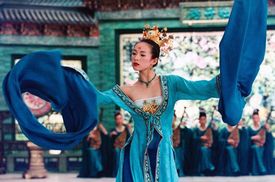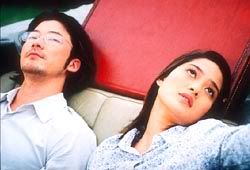Alternate title: Ryan's year of Asian film. Not really, since it's been clear for quite some time now that the best movies in the world are coming out of Asia, and not just Japan and Hong Kong. Add Korea, Thailand, and Taiwan as big art-house players. This list gets increasingly arbitrary towards the end, but then 10 is a fairly arbitrary number for ranking films. Just consider the top 5 my "favorites" and the rest as really strong films that I enjoyed a lot. I recognize that lists like these are pretty pointless, but it helps me keep my sanity after the Oscars and mostly idiotic mainstream critics have their say.
1. House of Flying Daggers

I'll try to do my best here to avoid superlatives. I'll also try to avoid ranting about critics and viewers unable to see past the spectacle (or, even worse, those who call it merely spectacle) to the rather complex subtleties of the film. On the other hand, it's a melodrama, and if you're too hip for that well I'm sorry for you. Let's just focus on the stunning visual rhymes which also have thematic weight. Consider for instance what seems like the rather pointless shot of falling leaves, which then becomes connected to an image of soldiers falling from the tops of trees, and then recognize this is visual demonstration of how the government views these disposable men, and exactly the fate that each protagonist is trying to escape. The numerous reversals of the plot are not merely "gotcha" storytelling but also investigations into the difficulty of being able to tell when someone is being genuine or not. People pretending to be in love will fall in love, and is their allegiance to the game or something else, something higher, more authoritative perhaps? The final scene in particular hinges on a moment of extreme mendacity, and almost superfluous cruelty, that extends but does not solve the problem of shifting appearances. The perpetrator, the third wheel of this particular love triangle, is a representative of the conflicting systems of power in control of both protagonists, and so shows that his power (and so the system's) is based on mere appearance. His final act proves that he is just playing a game with their lives. The problem is that in this film the games go all the way up and all the way down, and their attempt to escape these systems (of death, really) cannot but fail at a moment of yet another false appearance.
2. Spring, Summer, Fall, Winter...and Spring

I have already written about this one here. I mostly agree with what I wrote there. The scene of extreme spiritual striving at the end of the film is still one of the most moving passages I have ever seen in a film, and while the rest of the film is very good, it's merely leading up to that moment.
3. Last Life in the Universe

A thoroughly bizarre film. Your standard modern ennui with your not standard at all Yakuza sub-plot (which basically disrupts all your previously held notions about the main character by the end of the film). I loved about this movie though, which literally had me smiling throughout most of it, despite how sad (and my god the ending is sad!) it is. English is apparently the lingua franca of the Asian world, and so this movie about a Japanese man in Thailand is mostly in English. This little conceit though works wonders for the movie. Since the characters can only talk in very simple sentences, and since communication is so hard, it serves to highlight the desire to simply talk to someone that drives so much of the film (the title reflects the protagonist's feelings of loneliness). Often language tapes are playing in the background and we are forced to listen to inane small talk in Japanese. Or someone begins to list all the words they know in Thai like "thank you" and "good luck." It's these little gestures of connection that make the film so powerful and so moving that I can forgive the cruel ending. Now, does any of that mean I have any idea why the Yakuzas show up, who our protagonist really is, and why, oh why, is the lead girl played by two different actresses? No, of course not.
4. Hero

Yet another great film from Zhang Yimou (see #1). This one was originally a much lesser film for me, but after a second viewing I turned around. The political meaning is debatable, and I go back and forth myself. But nevertheless, I love that the film depicts the fundamentally contradictory desires of doing the best for All and doing the best for Some. All of this leads us to make complex (and, crucially, morally culpable) decisions. It's probably the discomfort of being ethically challenged in this way that caused much of the political criticism of this movie. God forbid someone suggest we can't have our cake and eat it too. Besides, any movie starring both Tony Leung and Maggie Cheung is automatically great.
5. Friday Night Lights
The best American film of the year. There's one image in particular that stands out for me from early on: a football stadium brilliantly lit up surrounded by the oppressive darkness of West Texas. I don't think that poignant image is an accident since the film continually underscores that point: football is only shot at redemption and heroism these boys have. To merely look down on that desire would be disgusting, and to merely idealize it (and the inevitable suffering it causes) would be irresponsible. This movie miraculously avoids both. What we get is a tremendously empathetic portrayal of poor white Southerners, one that will perhaps go unheralded for quite some time from people for whom this way of life is too distant and alien and threatening after the Election. Racism, power, and poverty are placed before us as facts but not dwelled on. What we get is a mood piece, not investigative journalism. But this is not a grid-iron Hoosiers. That film was about achieved redemption. This movie is about failure and how one accepts it. That these boys are able to accept their ordinary non-heroic lives, or least that they have to accept that challenge, makes them heroes of a different sort. The final play of the final game would seem a bit over the top if it didn't perfectly underscore visually the thematic point it was making.
6. Eternal Sunshine of the Spotless Mind
Already overrated by lonely sadsack hipsters (hey that's me!) but it's still wonderful. Others have written on the Nietzschean parallels, so I won't bother.
7. Goodbye, Dragon Inn

Another small masterpiece from Ming-liang Tsai, who made What Time is it There? which is one of my favorite movies ever. Very funny, very perplexing and sad too. There's almost no dialogue in this movie, and the camera hardly moves. One shot in particular shows an empty movie theater for like 2 minutes. Ah, the rigors and pleasures of art house movie going! Only for the really hardcore cineastes I guess, but it is full of rapturous melancholy about our dreams, the movies, loneliness, and the vanishing communal aspect of movie going.
8. Before Sunset
Already written on this one here. I think I overrated it at first. Still great though.
9. The Return
A fascinating parable about something. I had an elaborate theory about this movie when I saw it a few months ago but now I have forgotten it. I think it had something to do with our desire for the Father conflicting with out desire for Freedom. What sticks in my mind is the Oedipal power struggle, as well as failures of trust that prove so fatal. "I could love you if you weren't so cruel" says the younger boy to his father. Or is he talking to God?
10. Collateral
Action existentialism. Hero confronts nihilism and overcomes it. Ok, I eat that stuff up but you may be yawning. Fair enough. See it for the simply gorgeous vision of a rundown nighttime LA. A dreamscape that turns into a nightmare.
Also good:
Kill Bill, vol. 2
Anchorman
Dogville
Sideways
The Aviator
Million Dollar Baby
Harold and Kumar Go to White Castle
No comments:
Post a Comment